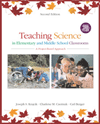| accommodation | A permanent change in an individual's mental structure.
|
 |
 |
 |
| active engagement | Students ask and refine questions related to phenomena; they predict and explain phenomena; and they mindfully interact with concrete materials. Active engagement, then, is both mental and physical.
|
 |
 |
 |
| adaptation | An individual's attempt to create an accurate view of the world so that she can continue the process of development.
|
 |
 |
 |
| assimilation | An individual fitting new information into existing mental structures or schemes.
|
 |
 |
 |
| authentic tasks | Tasks that have meaning for the child beyond the classroom.
|
 |
 |
 |
| bidirectional zone of proximal development | The fluctuations among group members-sometimes members are the teacher and sometimes they are the learner.
|
 |
 |
 |
| coaching | Providing suggestions to help the student develop knowledge or skills.
|
 |
 |
 |
| concrete operations | A phase of development where children develop the ability to apply logical thought to problems they come across in their environment.
|
 |
 |
 |
| content knowledge | The central concepts, principles, and theories in an area of study.
|
 |
 |
 |
| contextualized | Knowledge cannot easily be separated from the situation in which it is developed.
|
 |
 |
 |
| equilibration | The process of an individual modifying his/her mental structures to fit new experiences he/she encounters.
|
 |
 |
 |
| faded | A process where the support must decrease over time.
|
 |
 |
 |
| formal operations | A phase when the child becomes able to apply logical thought to all types of problems-including ones he/she cannot actually experience directly.
|
 |
 |
 |
| inert knowledge | Understanding that is stored in the mind but that cannot be retrieved or used in appropriate situations.
|
 |
 |
 |
| learning communities | A group of students using techniques to help each other learn.
|
 |
 |
 |
| learning cycle | An instructional model that consists of phases of instruction that help students learn by providing them with direct experiences with concrete materials, opportunities to construct understandings about concepts, and chances to apply their understandings to new situations.
|
 |
 |
 |
| learning technologies | Technology tools that can support students in learning.
|
 |
 |
 |
| marking critical features | A necessary or important attribute.
|
 |
 |
 |
| meaningful understanding | When a learner builds relationships and connections between ideas and blends personal experiences with more formal scientific knowledge.
|
 |
 |
 |
| metacognitive knowledge | Having knowledge about cognition in general, as well as awareness and knowledge about her own cognition.
|
 |
 |
 |
| modeling | The process through which a more knowledgeable person illustrates to the learner how to complete a task.
|
 |
 |
 |
| multiple representations | More than one depiction or form.
|
 |
 |
 |
| multiple resources | More than one source of information.
|
 |
 |
 |
| preoperational thought | A phase characterized by the development of language and rapid conceptual development focused on mastering representations without thorough understanding.
|
 |
 |
 |
| prior knowledge | Knowledge that students gained in life before the current topic was introduced.
|
 |
 |
 |
| procedural knowledge | Knowledge to find solutions to questions, to design an experiment, and to find and evaluate background information related to a question.
|
 |
 |
 |
| receptional approaches | Transmitting information, and students receiving the information.
|
 |
 |
 |
| reducing complexity | Withholding complex understandings or tasks until the learner has mastered simpler understandings or subtasks.
|
 |
 |
 |
| reflection | Thinking about alternative questions, considering possible hypotheses, contemplating a variety of answers, speculating on outcomes, deliberating on steps that can be taken, and meditating on conclusions found.
|
 |
 |
 |
| scaffolding | A process in which a more knowledgeable individual provides support to another learner to help him or her understand or solve a problem.
|
 |
 |
 |
| schemas | Blueprints that guide behavior and reasoning.
|
 |
 |
 |
| sensorimotor intelligence | A phase where the child interacts with the environment through sensory and muscular activity.
|
 |
 |
 |
| sequencing | Breaking a difficult task into much smaller, manageable, step-by-step subtasks.
|
 |
 |
 |
| social constructivism | A theory of learning that holds that children learn concepts or construct meaning about ideas through their interactions with and interpretations of their world, including essential interactions with others.
|
 |
 |
 |
| transformational approaches | Teaching models that involve teachers supporting students to make sense of material.
|
 |
 |
 |
| using visual tools | Using pictorial prompts that help students understand their own thinking processes.
|
 |
 |
 |
| zone of proximal development | The hypothetical space between assisted and unassisted performance of a learner.
|



 2003 McGraw-Hill Higher Education
2003 McGraw-Hill Higher Education